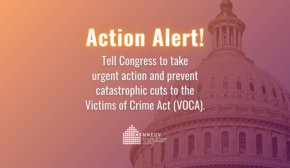Chatting to #CenterEachOther
October 24, 2016
This article also appears on YWCA’s Week Without Violence Blog Carnival.
In partnership with allies, colleagues, and supporters from across the country,* the National Network to End Domestic Violence (NNEDV) and WomensLaw convened a bilingual Twitter chat as part of the national Week of Action. Together, we discussed how to “tie-in” each other’s work and address the varied needs of survivors and their families. Advocates shared ways that their organizations work to end domestic violence, as well as multiple barriers that survivors face.
Lasting change requires inclusivity, so it was no surprise that the importance of intersectionality was a recurring theme throughout the hour-long chat. Survivor needs cannot be met through a “one size fits all” approach. In order to eliminate domestic violence we must address all forms of oppression including – but not limited to – racism, sexism, ageism, homophobia, and classism.
Advocates voiced their concerns and efforts to address such issues as the prevalence of firearms in domestic violence and the growing need for responsible firearm laws; working to meet the unique needs of LGBTQ victims; sustaining culturally specific programs; engaging men and boys as allies in the movement to end violence against women; and economic justice and financial empowerment. Through national dialogue, effective programming, and collaborative efforts we are working together to move the needle and help end domestic violence.
Participants discussed ways to change popular conversations about domestic violence and promote a culture shift that will ultimately help end domestic violence (which ties in perfectly to our #31n31 campaign for Domestic Violence Awareness Month that challenges widely held perceptions about domestic violence). Advocates shared that culture change is necessary: we must shift away from permissive “boys will be boys” rhetoric and attitudes toward positive norms that build in education and conversations with children about healthy relationships. We must dismantle the belief that domestic violence is only a women’s issue and question the way the media portrays domestic violence. The media rarely reflects diversity and often minimizes abuse, which can affect our assumptions about victims and believing their experiences.
Advocates discussed education and training, both within the field and to the broader public. Participants suggested ways to redefine gender roles that often perpetuate violence in relationships, and begin placing more emphasis and value on equality, respect, and nonviolence.
Ending domestic violence will not happen overnight; however, working together, it IS possible. In a perfect world, we could raise our magic wands and provide unlimited resources to obtain financial security, break down barriers that keep women of color from accessing resources, and eliminate stigma that LGBTQ victims, victims living with HIV, or men experiencing abuse face. In that perfect world, we would have what we need to empower victims and ultimately eliminate domestic violence. While there is no magic wand, there is power and determination when our organizations are centered and connected in this work.
The National Network to End Domestic Violence (NNEDV) strives to create meaningful collaboration with other organizations to promote and create a world free from domestic violence. To #CenterEachOther means to support the expertise that we and the survivors we serve every day bring to the table. “Centering each other” makes domestic violence a national concern, promoting peace and safety through every community and every home. Together we are stronger.

* #CenterEachOther Co-hosts:
AEquitas
Asian Pacific Institute on Gender-Based Violence
Association for Progressive Communications
ATCEV
A CALL TO MEN
Black Women’s Health Imperative
Casa de Esperanza: National Latin@ Network
Center for Economic and Policy Research
CiviliNation
Collective Action for Safe Spaces (CASS)
Colorado Coalition Against Domestic Violence
DC Coalition Against Domestic Violence
Embassy of Argentina / Cancillería Argentina
Everytown for Gun Safety
Generation Progress, Center for American Progress
Hollaback!
It’s On Us
Jane Doe, Inc.
Joyful Heart Foundation
La Clínica
Legal Momentum
Maryland Network Against Domestic Violence
Men Can Stop Rape
Mexico Consulate in Philadelphia
Mil Mujeres
Minnesota Coalition for Battered Women
Moms Rising
My Sister’s Place
National Center on Domestic & Sexual Violence
National Center on Domestic Violence, Trauma, & Mental Health
National Clearinghouse on Abuse in Later Life (NCALL)
National Domestic Violence Hotline
National Indigenous Women’s Resource Center
National Resource Center on Domestic Violence
National Sexual Violence Resource Center
Nebraska Coalition to End Sexual and Domestic Violence
New York State Coalition Against Domestic Violence (NYSCADV)
NW NetworkPrevention Innovations Research Center
RI Coalition Against Domestic Violence
South Carolina Coalition Against Domestic Violence and Sexual Assault
Stalking Resource Center
Syrian American Medical Society
Tahirih Justice Center
Twitter
U.S. Positive Women’s Network
United State of Women (USOW)
Virginia Sexual & Domestic Violence Action Alliance
YWCA Canada | A Turning Point for Women
YWCA USA
YWCA’s Week Without Violence is part of a global movement to end violence against women and girls with the World YWCA. Want to join the movement to end gender-based violence? Learn more at www.YWCAweekwithoutviolence.org and join the conversation on Twitter with #WorkAgainstViolence.





